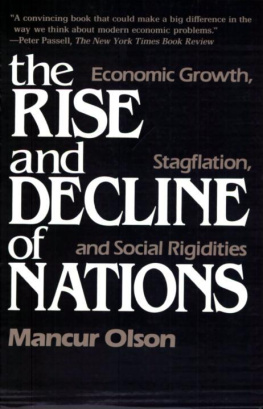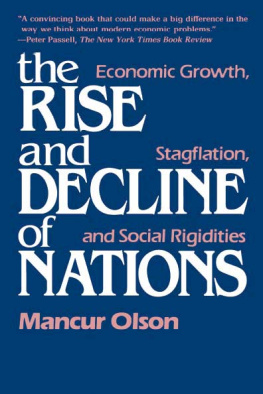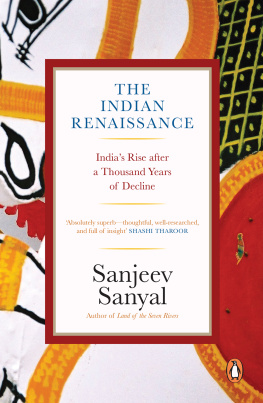Mancur Olson





For Ellika, Mancur Severin, and Sander


It may seem strange, at a time when so many find fault with economics, that an economist should claim to extend existing economic theory in a way that not only explains the "stagflation" and declining growth rates that have given rise to the recent complaints, but also provides a partial explanation of a variety of problems usually reserved for other fieldsthe "ungovernability" of some modern societies, the British class structure and the Indian caste system, the exceptionally unequal distribution of power and income in many developing countries, and even the rise of Western Europe from relative backwardness in the early Middle Ages to dominance of the whole world by the late nineteenth century. Yet the successful extension or improvement of something we have found unsatisfactory is commonplace: the technology that was impractical or full of bugs may after further development become economical and reliable. So also economics, even when it has encountered increasing skepticism, may with the aid of a new idea help to explain matters it could not explain before.
If we step back to gain perspective, we see not only the embarrassments of many economists in the last decade, but also more than two centuries of cumulative intellectual advance. I am fond of quoting Newton's assertion that, if he had seen farther than others, it was because he stood on the shoulders of giants. If Newton could say that in the seventeenth century, surely the trained economist today, however limited in stature, can claim at least as high a perch. The economist is the heir of several thinkers of recognized genius, such as Smith, Ricardo, Mill, Marx, Walras, Wicksell, Marshall, and Keynes, as well as of the yeoman labor of many hundreds of intelligent men and women. Indeed, since the giants of economics usually stood in turn on the shoulders of their predecessors, it is as though the economist today were standing atop a great pyramid of talent. Why, then, have so many economists failed to anticipate the emergence of new economic realities in the 1970s and 1980s? Perhaps it is because, wearing professional blinders, they have looked only straight ahead at phenomena economists have habitually examined. This book attempts to show that if we take the trouble to look to the side, at the domains of other disciplines, we shall gain a different conception of the entire landscape.
In part because this study encompasses several disciplinary domains, and even more because it aspires to reach policy-makers and students, I have worked hard to write this book in a language different from the one I use for articles in technical economic journals. This book is accordingly longer than it would need to be for the fellow economists who are my first concern, but I believe it is (with the exception of some notes and parenthetical expressions) also accessible to intelligent men and women in any profession. Luckily, most of the ideas I have come upon here turn out, once they are properly understood and explained, to be astonishingly simple.
I am indebted not only to the economists of the past, but also to an unusually large number of generous critics who have commented on drafts of this book and the papers out of which it has grown. These kind critics are so numerous and scattered that I have added a special acknowledgments section at the end of the book in an effort to do justice to them. The foundations and other organizations that have supported my research are less numerous, so I can mention them here. The most important source of support for my research has been the economics, social science, and policy research programs of the National Science Foundation-the Innovation Processes Research Program, the Economics Program, and the Measurement Methods and Data Resources Program. Despite their slender means and the manifold demands upon them, these programs have provided invaluable support for the research that underlies this and my other professional writings. I am also grateful to Resources for the Future, not only for support and stimulating hospitality, but also for patiently agreeing to wait when I delayed a hook on their concerns to finish this book. The Environmental Protection Agency and the Sloan Foundation have also been helpful, and the Lehrman Institute, the Hoover Institution of Stanford University, and the Woodrow Wilson International Center for Scholars have also put me in their debt with fellowships that provided some months of freedom for my writing.
My thanks to the foregoing institutions are surpassed only by my gratitude to my family. A book such as this requires intense concentration over many years, and my wife and children have, above all else, given me the peace of mind that made such concentration possible. Since The Logic of Collective Action was dedicated to my wife, Alison, it is fitting that this book, a descendant of that one, is dedicated to our three children.



Many have been puzzled by the mysterious decline or collapse of great empires or civilizations and by the remarkable rise to wealth, power, or cultural achievement of previously peripheral or obscure peoples. The collapse of the Roman Empire in the West and its defeat by scattered tribes that would otherwise have been of no account is only one of many puzzling examples. On repeated occasions the imposing empires of China have decayed to the point where they could fall prey to far less numerous or sophisticated peoples like the Mongols or to uprisings by poor peasants in remote provinces. The Middle East provides several examples of such collapsed empires, and so do the Indian civilizations of MesoAmerica; even before the Aztec empire was destroyed by a small contingent of Spaniards there had been a succession of empires or cultures, each of which seems to have been supplanted by a previously obscure tribe, its grand pyramids or cities abandoned to the wilderness. The pattern was not greatly different in the Andes, or at Angkor Wat, or in still other places. It was evident among the Greek city-states at the time of Herodotus, who said that "the cities that were formerly great, have most of them become insignificant; and such as are at present powerful, were weak in olden time. I shall therefore discourse equally of both, convinced that human happiness never continues long in one stay. "'



























